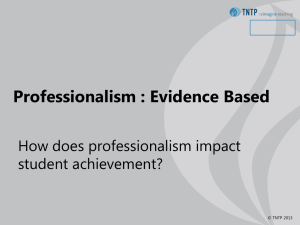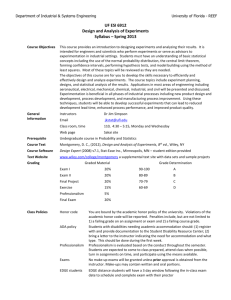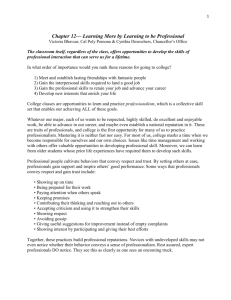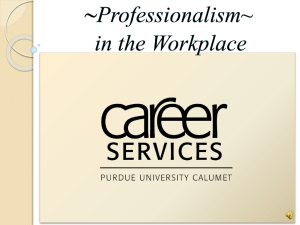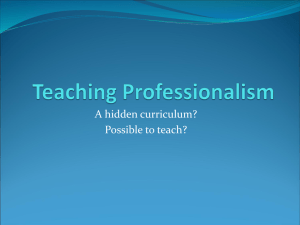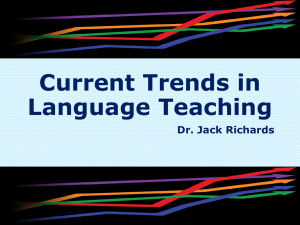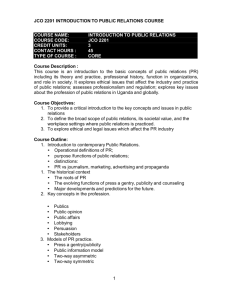Teacher professionalism in a new era
advertisement
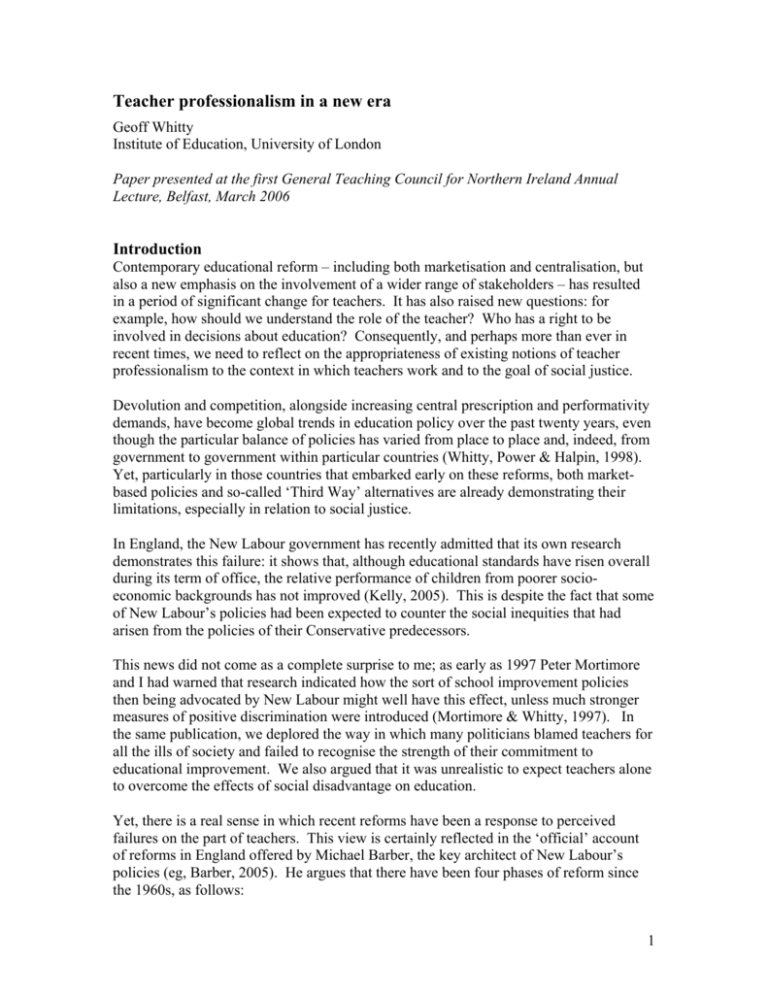
Teacher professionalism in a new era Geoff Whitty Institute of Education, University of London Paper presented at the first General Teaching Council for Northern Ireland Annual Lecture, Belfast, March 2006 Introduction Contemporary educational reform – including both marketisation and centralisation, but also a new emphasis on the involvement of a wider range of stakeholders – has resulted in a period of significant change for teachers. It has also raised new questions: for example, how should we understand the role of the teacher? Who has a right to be involved in decisions about education? Consequently, and perhaps more than ever in recent times, we need to reflect on the appropriateness of existing notions of teacher professionalism to the context in which teachers work and to the goal of social justice. Devolution and competition, alongside increasing central prescription and performativity demands, have become global trends in education policy over the past twenty years, even though the particular balance of policies has varied from place to place and, indeed, from government to government within particular countries (Whitty, Power & Halpin, 1998). Yet, particularly in those countries that embarked early on these reforms, both marketbased policies and so-called ‘Third Way’ alternatives are already demonstrating their limitations, especially in relation to social justice. In England, the New Labour government has recently admitted that its own research demonstrates this failure: it shows that, although educational standards have risen overall during its term of office, the relative performance of children from poorer socioeconomic backgrounds has not improved (Kelly, 2005). This is despite the fact that some of New Labour’s policies had been expected to counter the social inequities that had arisen from the policies of their Conservative predecessors. This news did not come as a complete surprise to me; as early as 1997 Peter Mortimore and I had warned that research indicated how the sort of school improvement policies then being advocated by New Labour might well have this effect, unless much stronger measures of positive discrimination were introduced (Mortimore & Whitty, 1997). In the same publication, we deplored the way in which many politicians blamed teachers for all the ills of society and failed to recognise the strength of their commitment to educational improvement. We also argued that it was unrealistic to expect teachers alone to overcome the effects of social disadvantage on education. Yet, there is a real sense in which recent reforms have been a response to perceived failures on the part of teachers. This view is certainly reflected in the ‘official’ account of reforms in England offered by Michael Barber, the key architect of New Labour’s policies (eg, Barber, 2005). He argues that there have been four phases of reform since the 1960s, as follows: 1 Uninformed professionalism – the period prior to the 1980s, often regarded as the golden age of teacher autonomy but when, according to Barber, teachers lacked appropriate knowledge, skills and attitudes for a modern society Uninformed prescription – the period following the election of Margaret Thatcher’s Conservative government in 1979 and, in particular, its imposition of a National Curriculum in 1988 for political rather than educational reasons Informed prescription – the period following the election of Tony Blair’s New Labour government in 1997, bringing with it (in Barber’s view) ‘evidence-based’ policies such as the Literacy and Numeracy Strategies and Standards-based teacher training Informed professionalism – a new phase, just beginning, when teachers will have appropriate knowledge, skills and attitudes so that the government can grant them a greater degree of licensed autonomy to manage their own affairs. As Dainton (2005) rightly points out, Barber provides a crude analysis that is historically inaccurate. She also wryly comments that ‘“delivering” someone else’s thoughts, ideas, strategies and lesson plans hardly counts as “informed professionalism”’ (159). In response, however, I shall suggest that, while New Labour’s managerialist reforms have so far failed to create the conditions for ‘informed professionalism’, let alone the positive equity outcomes that their advocates predicted, they have contained some ‘progressive moments’. These will need to be held onto as we seek to develop a form of professionalism that transcends both traditional professionalism and the attacks on that tradition implicit in recent reforms. In this paper, therefore, I shall be interrogating these reforms with a view to establishing the possibilities for what I (and others) have termed ‘democratic professionalism’. Approaches to defining ‘professionalism’ I want to begin by looking briefly at approaches to defining ‘professionalism’. As I argued in my book Making Sense of Education Policy (Whitty, 2002), sociological discourse about professionalism and the state can go some way in helping us to understand the contemporary condition of teachers as professionals. The nature of professionalism was initially subjected to concerted attention by sociologists in the 1950s. The main approach at this point focused on establishing the features that an occupation should have in order to be termed a profession. A typical list included such items as: the use of skills based on theoretical knowledge education and training in those skills certified by examination a code of professional conduct oriented towards the ‘public good’ a powerful professional organisation (Millerson, 1964). 2 These lists reflected the nature of established professions such as medicine and law, while occupations that did not entirely meet such criteria were given the title ‘quasi-’ or ‘semiprofessions’ (Etzioni, 1969). Moving to ‘full’ professional status was seen as part of an aspiring occupation’s ‘professional project’ and this has applied to the strategy of teachers in many countries. In contrast, more recent sociological perspectives on professionalism have rejected such normative notions of what it means to be a professional. Instead, they see professionalism as a shifting phenomenon – a profession, they suggest, is whatever people think it is at any particular time (Hanlon, 1998). Rather than asking whether the teaching profession lives up to some supposed ideal, such an approach encourages us to explore the characteristics of teaching as an occupation in the present. Other contemporary sociologists, particularly those working in a feminist perspective, have taken a more directly critical stance towards traditional conceptions of professionalism. For example, Davies (1995; 1996) regards the ‘old professions’ as characterised by elitism, paternalism, authoritarianism, highly exclusive knowledge, control and detachment. Such sociologists therefore question whether aspiring to this model is appropriate. In practice, of course, in most countries the characteristics of a profession have been increasingly determined by the state, which became the major stakeholder in defining professionalism in the twentieth century. Most professionals are employed, or at least regulated, by governments, with professional status typically dependent on the sort of bargain an occupation has struck with the state – what is sometimes called its ‘professional mandate’. The nature of teachers’ professional mandate has become a key policy issue for governments in many countries, sometimes as part of a broader attempt to redefine professionalism, especially in the public sector, and sometimes as a specific aspect of education reform. I shall now look at the policy developments and their drivers that have contributed to these agendas. From the ‘golden age’ of teacher autonomy to ‘steering at a distance’ The teaching profession in England, and indeed Northern Ireland, has never enjoyed the ‘licensed autonomy’ that occupations such as medicine and law have traditionally had, whereby they have been permitted by the state to regulate their own affairs. Nevertheless, from the 1950s until the mid-1970s, it experienced a considerable degree of de facto autonomy – that ‘golden age’ of teacher control (Le Grand, 1997). Parents were expected to trust teachers to know what was best for their children. Accordingly, the teacher’s role included the freedom to decide not only how to teach but also what to teach. In this, they had a particular responsibility for curriculum development and innovation. Even though effectively the state paid most teachers’ salaries, it did not intervene actively in the content of either teacher training or the work of teachers in schools. From the mid-1970s, however, there were some dramatic changes in policy and, linked to these, attempts to change the nature of teacher professionalism. Due to economic downturn across the industrialised west, there was growing criticism of the ‘swollen 3 state’ of post-war social democracy, not only for cost reasons but also because the welfare state had failed to deliver its original promise. This became coupled with an intellectual critique of public sector management on the part of neo-liberals and public choice theorists. The outcome was a call for public sector providers to be subjected to greater accountability – both through market-based competition and increased surveillance by the state. Particularly under Thatcherism and similar regimes elsewhere, there were swingeing attacks on public sector professions, including teachers, who were accused of abusing their autonomy to the detriment of pupils and society. A key strand of policy, as in other countries, has been to re-position public sector schools as competitors in the marketplace, encouraging them to behave more like those in the private sector. Parents have been offered greater choice over the school that their children attend, which is often coupled with a shift to per capita funding and, in some cases, experimental voucher systems. Budgets and managerial power are handed down to schools in the expectation that they can then respond more effectively to the preferences of parents as consumers. While these developments are probably less advanced in Northern Ireland than elsewhere in the United Kingdom, local management of schools and similar arrangements are already in place. When the Transfer Test is abolished the Department of Education has pledged to put in place a new system based on informed parental and pupil choice in the context of a more differentiated system. However, while contemporary governments have been enthusiastic about making schools more receptive to parents’ wishes, they are generally unwilling to relinquish control over the outcomes that schools should achieve. Thus, we have the apparent paradox of the ‘free market and the strong state’ (Gamble, 1988). While devolution appears to offer organisations greater autonomy, the state retains overall strategic control by setting the outputs that providers need to achieve (Neave, 1988: 11). This is operationalised through the range of targets and performance indicators, and associated league tables that have grown up around ‘marketised’ systems. Although justified in terms of providing information for the ‘consumer’ and greater public accountability, these indicators also enable government to scrutinise and direct providers. Arguably, they indirectly influence the priorities of parents – who in turn reinforce the pressure on schools to achieve government-determined outcomes (Adnett & Davies, 2003). These developments have obvious implications for teachers and teacher professionalism. Standardised criteria now feed into the framework of targets and indicators that schools and individual teachers must work to, and the new assessment regimes provide a wealth of performance data for their managers at all levels of the system. Although performance indicators severely delimit and direct what and how schools manage their resources, the stakes that are involved have still necessitated the growth of managerialism and the development of a distinct managerial tier within schools. One consequence of this is likely to be increased fragmentation of the profession. 4 From New Right restructuring to New Labour revisionism In England, the Conservative government’s 1988 Education Reform Act has often been seen as the epitome of a policy combining market forces and state control. Similar levels of prescription in relation to the curriculum were introduced in Northern Ireland a year later. Importantly, however, policy under the Conservatives by no means represented the height of these trends in England. Despite the proclaimed ‘Third Way’ approach of New Labour after 1997, in practice its education reforms have built on the ‘new right settlement’ and even gone beyond it – combining devolution, diversity, choice and even privatisation, on the one hand, and centralised regulation, monitoring and even pedagogical prescription, on the other. As part of this, under New Labour, we have begun to see developments that reinforce and ‘concretise’ changes in the conceptualisation of teacher professionalism. There seems to have been a progressive move away from a concern with up-skilling teachers as individuals or even seeing responsibility for educational improvement as lying largely in the hands of the teaching profession, however it is regulated. Instead, there has been a growing focus on education as a collective endeavour, encompassing a much wider range of stakeholders than merely the state and teachers themselves. This approach was effectively summarised in the 1998 Green Paper, Teachers: meeting the challenge of change (DfEE, 1998), which noted that ‘The time has long gone when isolated, unaccountable professionals made curriculum and pedagogical decisions alone, without reference to the outside world’. It went on to list what, in the government’s view, a modern teaching profession needed: to have high expectations of themselves and of all pupils; to accept accountability; to take personal and collective responsibility for improving their skills and subject knowledge; to seek to base decisions on evidence of what works in schools in the UK and internationally; to work in partnership with other staff in schools; to welcome the contribution that parents, business and others outside a school can make to its success; and to anticipate change and promote innovation. In this respect, New Labour’s agenda for education may provide a useful ‘case study’, or ‘ideal type’ of where professionalism in education is heading – and I want to look briefly at a few examples of the policies that have emerged from it. Certainly, there has been a reinforcement by New Labour of the need for the state to take a much more assertive role in specifying what teachers are expected to achieve, rather than leaving it to professional judgement alone. There is a real enthusiasm for intervening in 5 the detail of educational processes, with advice on all aspects of the day-to-day running of schools and teaching itself. Furlong (2005) highlights the 2,000 model lesson plans that teachers can now download from the Department for Education and Skills (DfES) website – something that would have been unthinkable in England not many years ago and is reminiscent of traditional English criticisms of highly centralised systems such as those of France. National Literacy and Numeracy Strategies This approach of intervening in the detailed processes of teaching, specifying how to teach in addition to what to teach, supposedly based on evidence of ‘what works’, is particularly evident in New Labour’s National Strategies for Literacy and Numeracy. Although the levels of prescription we have seen in England have not been introduced in Northern Ireland, the Department of Education has produced the Strategy for the Promotion of Literacy and Numeracy in Primary and Secondary Schools (DENI, 1998). This has brought a drive for greater coherence and consistency across schools and some degree of additional target setting. In one sense, the Strategies are just one element of a long process of curriculum reform stretching back to the introduction of the National Curriculum. But they are also qualitatively different, both in their immediate impact on teachers’ work, and through the pace of change they have ushered in. Delivery has been standardised through prescribed content and a well-defined sequence and structure to lessons, coupled with the promotion of particular teaching approaches – for example, the Literacy and Numeracy Hours (see Webb et al, 2004). Increased funding for research on ‘what works’, professional development courses for teachers, books and the production of classroom materials supported this effort to standardise provision. In turn, the Strategies have included ambitious targets and a significant programme of pupil assessments to monitor achievement and the extent to which all pupils were reaching a given level in their literacy and numeracy. In this, the levers of monitoring and target setting have been such that they have enabled the centre to steer schools and teachers much more closely than before (Moss, 2004). More recently, steering at a distance has entailed a combination of target setting and incorporating schools themselves by requiring them to engage in a process of self-evaluation. As the broader Primary and Secondary Strategies – into which the literacy and numeracy strategies have been absorbed – also embrace a national approach to the improvement of behaviour and attendance, they arguably extend the scope of this central direction ever further. Complementary changes to teacher education Another area of reform has been teacher education, which has seen changes to both its structure and content. In England, training is now largely school-based, even on programmes led by universities. It is a more practically-based form of preparation, with an emphasis on training rather than education and, in particular, the achievement of practical competences that are set centrally (Furlong et al, 2000). 6 The highly diverse array of teacher training courses provided by universities and colleges in England was first brought under centrally mandated requirements in 1984. Accreditation was now dependent on meeting officially defined criteria, including the number of weeks to be spent in school and the number of hours to be spent on English and mathematics in primary training (DES, 1984). Control was tightened from the late 1980s with a series of government circulars setting out competences that had to be met by students before qualifying to teach (DES, 1989; DfE, 1992, 1993). The work some of us did for the Department of Education in Northern Ireland in the 1990s was critical of this approach and we expressed the view that ‘the atomisation of professional knowledge, judgement and skill into discrete competences inevitably fails to capture the essence of professional competence’ (DENI, 1993: 4). And, indeed, in some cases, such an approach led to an unduly bureaucratic model of student teacher development that, at its worst, was focused much more upon ticking boxes of statements of competence than upon the real issues related to teaching and learning. Another development, which was taken up by the incoming New Labour government in 1997, effectively turned the competences into what was an ultimately unworkable eightyfive page ‘national curriculum’ for teacher training. This specified in very great detail the content that had to be covered by trainee teachers in English, mathematics, science and ICT. As Furlong et al (2000) point out, although the curriculum was designed to constrain teacher educators rather than the trainees themselves, it could be argued that the ‘hidden curriculum’ of this approach provided ‘…appropriate socialisation into a profession in which official prescription of teaching approaches (encroaches) on autonomous professional judgements’ (154). New Labour has now abandoned this national curriculum to focus on the stipulation of standards to be achieved by all trainees (DfES/TTA, 2002). The resulting standards do respond to criticisms of earlier versions by recognising the importance of reflexive practice and, overall, represent a somewhat more manageable and holistic set. But it took almost a decade for the English authorities to recognise what we always argued in Northern Ireland – that individual competences that were not thoroughly and consistently underpinned by clear professional values would fail to deliver the sorts of professionals needed in the twenty-first century. The English standards are currently undergoing a further process of revision as the Training and Development Agency for Schools (TDA) develops a framework to cover teachers’ whole career rather than just the initial training. But there are still different sets of standards for different groups of teachers, some which the TDA finds it difficult to define clearly, e.g. Advanced Skills Teachers and Excellent Teachers. As my colleague, Sara Bubb, who is working closely with the GTCNI on the development of its own scheme, has put it: It’s such a shame the TDA hasn’t taken this golden opportunity to draft just one well thought through set of standards for the whole of the teaching profession, like the new 27 Northern Ireland competences…These recognise 7 that each standard is a continuum to be met to different degrees depending on a teacher’s role, experience and context. Doesn’t that make more sense? (Bubb, 2006). The TDA review has also specifically addressed the issue of teachers’ research skills. This represents a move towards recognising teaching as a research-based profession. As their draft standards currently stand, however, the only teachers for whom the use of research to inform teaching is stipulated are those with Advanced Skills and Excellent Teacher status. Like many who commented on the original draft, my view is that the whole profession should be research-informed, so I hope that the eventual standards will come to reflect this. On this basis, I welcome the General Teaching Councils’ inclusion of research pages on their websites. The GTC in Northern Ireland seems to pay particular attention to this – with the aim of collating a database of all educational research conducted in Northern Ireland and of facilitating practising teachers’ attendance at the North of England Conference this year. Looking more generally at Continuing Professional Development, in England there are now much broader opportunities opening-up for extended professional development through, for example, the TDA’s Postgraduate Development Programme. But, as with the draft teacher standards, these opportunities are currently available only to a small proportion of the workforce. At the same time, other courses for teachers have become increasingly centrally-defined and focused on short-term practical training closely tied to government Strategies – for example, additional phonics training to support the Literacy Strategy. In this sense, CPD opportunities are now largely focused on the needs of the school and its pupils rather than the individual teacher. The GTCNI is currently working to establish a ‘mixed economy’ model that addresses individual as well as school-based and systemic needs. Nevertheless, and particularly so in England, this shift reflects what is a broader significant development for the future of teacher professionalism – the emphasis on education as a collective endeavour and the role of other stakeholders in raising standards in school. Teacher professionalism in a changing context Workforce remodelling An important aspect of New Labour policy in England has been its school workforce remodelling agenda and the 2003 National Agreement on Raising Standards and Tackling Workload. A key element of this concerns the use of teaching assistants. While most sections of the support staff workforce in English schools have grown in recent years, the number of teaching assistants has risen dramatically. Between 1997 and 2005 the number almost trebled – from 35,500 to just under 100,000. By comparison, the number of full time equivalent (FTE) ‘regular’ teachers1 in the maintained sector rose by just 4,000 to reach around 430,000 last year (DfES, 2005a). 1 ‘Regular’ teachers are those who hold either a permanent contract or a temporary contract of one month or more. 8 The growth in teaching assistant numbers in England has been accompanied by marked changes in the nature of their responsibilities. This has involved a shift in focus from purely ‘care and housekeeping’ towards greater involvement in the actual process of learning – including, for example, assisting with the assessment of pupils’ learning. This expansion of the number and role of teaching assistants is not an entirely new idea in England. The 1967 Plowden Report and 1975 Bullock Report urged that more profitable use be made of welfare assistants and ancillary help (Marland & Rutter, 2001). By the 1990s, concerns about teacher supply and teacher workload again highlighted the potential for making greater use of support staff. It was the literacy and numeracy Strategies, however, that were the main driver for the first real expansion of teaching assistants and a widespread movement into learning support and even teaching-type roles in mainstream classrooms. While the remodelling agenda has seen administrative roles reallocated from teachers to support staff, it has also seen a ‘reaffirmation’ of the new role of teaching assistants. In particular, in 2004 the government established the Higher Level Teaching Assistant training and assessment programme, whereby teaching assistants can pursue Higher Level Teaching Assistant status. The government has taken the same approach to the training of teaching assistants as it has with teachers – setting out standards that must be evidenced. In this case there are thirty-one such standards to meet, many of which are not dissimilar to those for teachers (see TTA, 2003). The government has played an active role, then, in blurring the distinction between teachers and teaching assistants. Many of the teacher unions have accepted this, albeit with varying degrees of enthusiasm, as a means of helping teachers to focus on teaching rather than administration or behaviour control. The largest teachers’ union – the National Union of Teachers – however, refused to support the workload agreement. The union presented this in terms of the potential for the dilution of the professionalism of the teacher function and declining standards where staff without a teaching qualification were left in charge of whole classes – which ‘Higher Level’ teaching assistants are indeed permitted to do. By contrast, the government argued that the agreement was part of a process in which different professional and professionalising groups recognise their complementary roles in improving education in the interests of all (Morris, 2001). I understand that a recent review of teachers’ pay and conditions in Northern Ireland found strong opposition from both management and unions to the introduction and employment of Higher Level Teaching Assistants. This was partly because there is no general shortage of teachers and partly because their use is seen as reducing the standard of teaching provision (DENI, 2004). Children’s agenda Linked to workforce remodelling in schools is an even broader ‘Children’s Agenda’. Legislation based on the Every Child Matters Green Paper (DfES, 2003) has sought to ensure multi-agency work in the interests of children and involve children and young people themselves in decision making. To support this policy, Local Authorities are being encouraged to bring together education and social services departments into 9 powerful education and children’s services departments and to establish ‘Children’s Trusts’ to co-ordinate these services with other statutory and voluntary agencies. As part of this development, an ‘extended schools’ programme seeks to establish wider services in all primary and secondary schools – including study support and family learning opportunities and swift referral to a wider range of specialised support services, if not onsite services in childcare, youth justice, health and social care. This is something that has been tried successfully in Scotland and is often seen as vital if the effects of social disadvantage on educational achievement are to be minimised. In Northern Ireland the government will shortly publish its strategy for children and young people. Its consultation document incorporates many of these themes, emphasising the need for organisations at all levels and in all sectors to work together to support a ‘whole child’ needs-centred model. Draft actions for the Department of Education include exploration of the extent to which schools could be resourced to become multi-agency centres with out-of-hours usage (OFMDFM, 2004). These kinds of developments will obviously bring far-reaching changes to the way in which different welfare services are configured, but also to the way both teaching and support staff work with other professionals. Parents and business At the same time, particularly in England we have seen a greater emphasis on the voice of parents and business in relation to what happens in schools. Local Authorities and Ofsted have both sought to give more attention to parents’ interests. Ofsted, for example, will now be able to respond to concerns raised by parents themselves about their children’s schools. Meanwhile, businesses and other stakeholders have been increasingly encouraged to become involved in the education sector by part-funding and running anything from a local initiative to national programmes and individual schools (see Dickson et al, 2003). Specialist schools with sponsors now constitute the majority of secondary schools in England and all secondary schools are now being encouraged to take this path. Similar thinking underlies the Academies programme and controversial proposals for Trust schools (DfES, 2005b). I understand that a small-scale pilot of specialist schools in Northern Ireland, whereby schools must raise private sponsorship and develop sustainable links with business, is scheduled to commence in April. Exploring responses to recent reforms Faced with the sort of reforms I have outlined, there must be a strong temptation on the part of the teaching unions, and indeed the General Teaching Councils, to adopt defensive, exclusory positions associated with traditional models of professionalism. This is in some ways understandable – particularly in the face of government reforms that have undermined key elements of teachers’ autonomy and bargaining position. However, I would argue that it is also likely to prove untenable and we need anyway to consider what might be a more genuinely progressive strategy. Of course, these tensions are not just being played out through the unions. Those of us within the education research community have ourselves raised a range of deep-seated concerns about recent education policy in terms of its implications for teachers. In 10 particular, the process of marketisation and centralisation, growing performativity and the shift to standards-based teacher training have all been seen by some of my colleagues as an unacceptable attack on teacher autonomy and teacher creativity, transforming teachers from professionals to technicians (eg, Adams & Tulasiewicz, 1995; Tomlinson, 2001; Hall & Schulz, 2003). For Sachs (2003), writing in the Australian context but referring to cross-national trends in policy, the modern professional in the eyes of governments is increasingly one who works efficiently and effectively in meeting the standardised criteria set for the accomplishment of students and teachers as well as contributing to the school’s formal accountability processes. As Furlong (2005) similarly argues, this is a form of professionalism which accepts that decisions about what to teach, how to teach and how to assess children are made at school and national level rather than by individual teachers themselves. As he continues, this brings with it a move away from seeing the individual teacher as an essential actor. I do not necessarily disagree with these commentators’ observations on the ways in which reforms have impacted on teachers: I noted earlier my own concerns about, for example, performativity, managerialism and the nature of some sets of teacher competences and standards. However, where I differ with these commentators is in their tendency to imply that all current reforms will lead to the de-skilling and deprofessionalisation of teachers. Indeed, it seems to me that some of the reforms I have mentioned may have the potential to extend, rather than restrict, the professionalism of teachers. As a sociologist influenced by the contemporary approaches to the study of professionalism that I outlined earlier, I would argue anyway that what we are seeing in interventions such as New Labour’s in England is not necessarily an example of deprofessionalisation in some absolute sense, but an attempt at re-professionalisation – that is, the construction of a different type of professionalism, considered by those like Michael Barber to be more appropriate to the times and to New Labour’s political project. If this is the case, there may be possibilities for pursuing other strategies of reprofessionalisation. It may be that new ‘prospective’ identities could be constructed as an alternative both to an outmoded traditional professionalism and New Labour’s version. It is surely not necessary to move from academic critique of recent reforms to an argument that teachers’ professional judgement, whether individual or collective, should not be challenged. Indeed, to this extent, the questioning of traditional modes of professionalism by New Labour and similar governments elsewhere trades upon legitimate concerns about who has the right to make decisions about public education in a democracy. Hence, I am not entirely persuaded by the alternative solutions that academic commentators have typically offered so far. While these sometimes include calls for the ‘democratisation’ of the profession, they do not amount to the sort of ‘democratic professionalism’ that I would advocate. For example, although Leaton-Gray’s (2006) 11 conception of a more engaged professionalism properly entails fuller engagement of teachers with their professional associations, it ultimately looks rather too much like a traditional understanding of professionalism – with an emphasis on teachers exerting greater influence over policy and extending their autonomy as an end in itself. This is perhaps not the best way to win friends and influence people. As Lawton argued many years ago, there are different levels of decision making in education and the further one gets from the individual encounter in the classroom, the more other stakeholders need to be involved (Lawton, 1980). But even in the classroom, the active role of other adults and, indeed, students themselves is increasingly recognised as important in the development of appropriate learning environments (Fielding and Rudduck, nd; Fielding, 1999). The capacity to collaborate with others, rather than merely instructing them, must surely be an important competence on the part of contemporary professional teachers. In England, the expanding role of teaching assistants is a case in point. Similarly, both the English and Northern Ireland education departments are looking more closely at school councils and other mechanisms for pupil involvement in decision making in schools (OFMDFM, 2004; Adonis, 2005) With regard to teacher education, I have never taken the view that the governmentdefined standards cannot encapsulate the requirements of a forward-looking professionalism. And as I indicated earlier, even the officially specified competences and standards have now begun to modify the narrow technicist model of professionalism, initially in Northern Ireland but subsequently in England. Furthermore, the developments around the children’s agenda broadly defined will require a move away from purely cognitive targets for education and are likely to require some rebalancing of the standards and inclusion agendas. In my view, these are positive changes that should be welcomed and capitalised upon by teachers as extending their influence, but in partnership with others. In the parallel example of nursing and related professions, Gough (2000/01: 33) pointedly suggests that, in an era of patient empowerment, ‘enabling people around us to change is dependent on transforming ourselves first’. Advocates of a new style of professionalism within these occupations have seen the managerial reforms associated with markets and consumerism as offering possibilities for partnership, collaboration and reflective practice more suited to contemporary conceptions of citizenship and democracy than are traditional modes of professionalism within the health service. Thus Gough argues that empowering patients involves unpicking ‘old style professionalism’ and demands a new emphasis on ‘how the patient can be best served through new ways of working – not shoring up old professional demarcations and engaging in endless turf wars’. Implications for the General Teaching Councils I now turn to the question of how such developments position the General Teaching Councils for England, Wales and Northern Ireland – arguably New Labour’s one direct intervention in relation to teacher professionalism. 12 Established between 2000 and 2002, the General Teaching Councils each place raising the status of teaching and maintaining and promoting the highest standards of professional practice at the heart of their remit. At the time, the establishment of the Councils was seen by some as the turning point at which teaching had become a bone fide profession in terms of the traditional characteristics of a profession that I referred to earlier. This was especially so when they went on to develop codes of professional conduct. This aspect of the Councils is also reflected in the current membership of their governing councils – with the exclusion from membership of other sections of the school workforce and, certainly in England, the limited influence of other stakeholders. Having achieved, at least in some respects, the century-long occupational project of making teaching a profession in the traditional sense, it hardly seems fair to suggest that further change may be necessary. But we do need to consider whether, if the respective Councils are to maximise the positive influence of teachers in the changing context I have described, this is the model that serves them best. The dilemma about which way to go in response to recent developments is already evident in debates within England, and I would be surprised if similar issues did not arise in Northern Ireland. Take, for example, some reflections on the part of the Chief Executive of the GTC for England, Carol Adams, regarding the children’s agenda. As Carol notes, this agenda – and similar developments in Northern Ireland – raises a number of considerations for the teaching profession and its representative bodies. On the one hand, could pupils, parents and the wider community become confused about the unique role and contribution of the teacher? Could a child’s right to learn be threatened by the new multi-disciplinary agenda? While Carol herself welcomes many aspects of the new agenda, she argues that we need ‘to hold fast to the simple premise that a school is a centre of learning’ and thereby be clear about the role of the teacher (Adams, 2005). On the other hand, this does not necessarily require a defensive, exclusionary and inward looking stance on the part of teachers. Indeed, if the key question is how can teachers maximise children’s opportunities to learn, that can only be achieved by working ever more closely with the other stakeholders. Bringing about the conditions in which all young people can realistically, in the GTCE’s own words, ‘access the best possible standards of learning and achievement’ will necessitate much closer working with other professional groups and with progressive social movements, as well as changing teachers’ conventional ways of working where necessary to support the positive aspects of the new agenda. What we must achieve is surely a balance between defining the teacher’s proper role and staking out the territory too rigidly. In this respect, it is good to see that the GTCE has recently questioned why the TDA and the Children’s Workforce Development Council (CWDC) are consulting simultaneously on distinct sets of induction standards rather than working in tandem. Towards a ‘democratic professionalism’ However, it is notable that the GTCE’s concern here is to facilitate inter-professional working between distinct groups within the children’s workforce. But the sociological critique of professionalism as elitism could also apply to inter-professional agreements. 13 In a democratic society, the professions also need to be open to the concerns of other stakeholders. For myself, I have no problems about the government’s demand that other stakeholders should have a role in education decision making, though I do have a problem about its limited conception of who those other stakeholders might be and about how it goes about seeking involvement from them. In my view, genuine stakeholder involvement should be welcomed by the professions and the democratisation of professionalism should be adopted as an alternative to both the traditional professional project and the managerialist professional project currently promulgated by governments. A democratic professionalism would seek to demystify professional work and build alliances between teachers and other members of the school workforce, such as teaching assistants, and external stakeholders, including students, parents and members of the wider community. For many of these groups, and particularly marginalised sub-sets of them, decisions will have traditionally been made on their behalf either by professions or the state (Apple, 1996). If teachers are to make a real contribution to the equity agenda as well as the standards agenda, they must work actively with others committed to teaching for a just society (Gale & Densmore, 2000; 2003). A democratic professionalism thus encourages the development of collaborative cultures in the broadest sense, rather than exclusive ones. It certainly suggests that the teacher has a responsibility that extends beyond the single classroom – including contributing to the school, other students and the wider educational system, as well as to the collective responsibilities of teachers themselves to a broader social agenda. Indeed, under democratic professionalism, this broader agenda becomes part and parcel of the professional agenda rather than being counterposed to it. Sachs’ (2003) notion of an ‘activist identity’ for teachers goes some way towards recognising this. Her activist professional works collectively towards strategic ends, operates on the basis of developing networks and alliances between bureaucracies, unions, professional associations and community organisations. These alliances are not static, but form and are reformed around different issues and concerns. Activist professionals take responsibility for their own on-going professional learning, and work within multiple communities of practice. These develop in larger contexts – historical, social, cultural, institutional (181, see also Sachs, 2001). In conclusion, democratic professionalism and this associated ‘activist’ identity require not merely stronger professional bodies and associations but ones that are themselves prepared to work in an open and meaningful way with a much more varied range of stakeholders. In England this is not proving easy, not least because recent policies have undermined both the morale of, and public trust in the teaching workforce. This, in turn, has limited the extent to which teachers can engage authoritatively with other stakeholders. In Northern Ireland, however it may seem to you, the relative standing of teachers is such that you are starting from a position of greater strength and confidence as you confront the need to work with others to help shape the progressive opportunities that are provided by policies like those relating to the children's agenda. I hope the General Teaching Council for Northern Ireland will grasp this opportunity. 14 Acknowledgements This paper develops the analysis offered in my book Making Sense of Education Policy (Paul Chapman/Sage 2002). I am most grateful to Dr Emma Wisby for her help in the preparation of this paper. References Adams, A. & Tulasiewicz, W. (1995) The Crisis in Teacher Education: a European concern? London: Falmer Press Adams, C. (2005) comments made at the GTCE ‘Battle of Ideas’ Conference 29-30 October Adnett, N. & Davies, P. (2003) Schooling reforms in England: from quasi-markets to coopetition? Journal of Education Policy 18 (4) 393-406 Adonis, A. (2005) Council business Guardian 14th December Apple, M. (1996) Cultural Politics and Education Buckingham: Open University Press Barber, M. (2005) Informed Professionalism: Realising the Potential. Presentation to a conference of the Association of Teachers and Lecturers, London, June 11 Bubb, S. (2006) New teachers on the ropes Times Educational Supplement 3 February Dainton, S. (2005) Reclaiming Teachers’ Voices, Forum 47 (2), 159-167 Davies, C. (1995) Gender and the Professional Predicament in Nursing Buckingham: Open University Press Davies, C. (1996) The sociology of professions and the profession of gender Sociology 30 661-78 DENI [Department of Education in Northern Ireland] (1993) Review of Initial Teacher Training in Northern Ireland: Reports of Three Working Groups Bangor: DENI DENI (1998) Strategy for the Promotion of Literacy and Numeracy in Primary and Secondary Schools DENI DENI [Department of Education in Northern Ireland] (2004) Teachers’ Pay & Conditions of Service Inquiry: Final Report, Part 2 - Improving Conditions, Raising Standards and Negotiating Arrangements February DENI DES [Department of Education and Science] (1984) Initial Teacher Training: Approval of Courses Circular 3/84 London: DES DES [Department of Education and Science] (1989) Initial Teacher Training: Approval of Courses Circular 24/89 London: DES DfE [Department for Education] (1992) Initial Teacher Training (Secondary Phase) Circular 9/92 London: DfE DfE [Department for Education] (1993) The Initial Training of Primary Teachers Circular 14/93 London: DfE 15 DfEE [Department for Education and Employment] (1998) Teachers: meeting the challenge of change Green Paper London: DfEE DfES [Department for Education and Skills] (2003) Every Child Matters: Change for Children London: DfES DfES [Department for Education and Skills] (2005a) School Workforce in England (including pupil teacher ratios and pupil adult ratios), January 2005 (Provisional) http://www.dfes.gov.uk/rsgateway/DB/SFR/s000575/index.shtml DfES (2005b) Schools White Paper: Higher standards, better schools for all – more choice for parents and pupils London: TSO DfES/TTA (2002) Qualifying to Teach London: HMSO Dickson, M. et al (2003) ‘Education Action Zones: model partnerships?’ in, Franklin, B., Bloch, M. & Popkewitz, T. (eds) Educational Partnerships and the State: The paradoxes of governing schools, children and families, Basingstoke: Palgrave Macmillan Etzioni, A. (ed) (1969) The Semi-Professions and their Organisation: Teachers, nurses, social workers London: Collier-Macmillan Fielding, M. (1999) Radical collegiality: affirming teaching as an inclusive professional practice Australian Educational Researcher 26 (2) 1-34 Fielding, M. & Rudduck, J. (no date) Student voice and personalised learning Presentation to the Specialist Schools Trust and Secondary Heads Association Furlong, J., Barton, L., Miles, S., Whiting, C. & Whitty, G. (2000) Teacher Education in Transition: re-forming professionalism? Buckingham: Open University Press Furlong, J. (2005) New Labour and teacher education: the end of an era Oxford Review of Education 31 (1) 119-34 Gamble, A. (1988) The Free Economy and the Strong State London: Macmillan Gale, T. & Densmore, K. (2000) Just Schooling: Explorations in the cultural politics of teaching Buckingham: Open University Press Gale, T. & Densmore, K. (2003) Engaging Teachers: Towards a radical democratic agenda for schooling Maidenhead: Open University Press Gough, P. (2000/01) Nursing and its developing role: a British case study Eurohealth 6 (5) Winter Hall, C. & Schulz, R. (2003) Tensions in teaching and teacher education: professionalism and professionalisation in England and Canada Compare 33 (3) 370-83 Hanlon, G. (1998) Professionalism as enterprise: service class politics and the redefinition of professionalism Sociology 32 42-63 Kelly, R. (2005) Education and Social Progress, keynote speech, Institute for Public Policy Research, July 16 Lawton, D. (1980) The Politics of the School Curriculum London: Routledge & Keegan Paul Le Grand, J. (1997) Knights, knaves or pawns? Human behaviour and social policy Journal of Social Policy 26 149-64 Leaton-Gray, S. (2006) Teachers Under Siege Stoke on Trent: Trenthan Books Marland, M. & Rutter, A. (2001) Unsung heroes Report – magazine of the Association of Teachers & Lecturers 24 (2) 11 Millerson, G. (1964) The Qualifying Association London: Routledge & Kegan Paul Morris, E. (2001) Professionalism and Trust: the future of teachers and teaching London: DfES/Social Market Foundation Mortimore, P. & Whitty, G. (1997) Can School Improvement Overcome The Effects Of Disadvantage? London: Institute Of Education Moss, G. (2004) Changing practice: The National Literacy Strategy and the politics of literacy policy Literacy 38 (3) 126-33 Neave, G. (1988) On the cultivation of quality, efficiency and enterprise: an overview of recent trends in higher education in western Europe, 1968-1998 European Journal of Education 23 (1/2) 7-23 OFMDFM [Office of the First Minister and Deputy First Minister] (2004) Draft Strategy for Children and Young People in Northern Ireland – consultation document (http://www.allchildrenni.gov.uk/strategy.pdf) Sachs, J. (2001) Teacher professional identity: competing discourses, competing outcomes Journal of Education Policy 16 (2) 149-61 Sachs, J. (2003) Teacher professional standards: controlling or developing teaching? Teachers & Teaching: Theory and Practice 9 (2) 175-86 TTA [Teacher Training Agency] (2003) Professional Standards for Higher Level Teaching Assistants http://www.tda.gov.uk/upload/resources/pdf/h/hlta-standards-v6.pdf Tomlinson, S. (2001) Education in a Post-Welfare Society Buckingham: Open University Press Webb, R., Vulliamy, G., Hamalainen, S., Sarja, A., Kmonen, E. & Nevalainen, R. (2004) A comparative analysis of primary teacher professionalism in England and Finland Comparative Education 40 (1) 83-107 Whitty, G. (2002) Making Sense of Education Policy London: Sage Whitty, G., Power, S. & Halpin, D. (1998) Devolution and Choice in Education: The school, the state and the market Buckingham: Open University Press 17
